A constitutional amendment requiring a supermajority of lawmakers to approve tax increases failed to muster enough votes to pass in the Kansas Senate early Thursday morning.
The amendment came up two votes short of the 27 it needed to pass the Senate. The vote was 25-14 in favor of the amendment.
The amendment would have required a two-thirds majority of the House and Senate to enact any new state tax or increasing the rate of the existing state income tax, sales tax, compensating use tax, property tax or excise tax.
The amendment would have gone to voters on Aug. 2.
“I understand some legislators don’t like making it more difficult for the Kansas Legislature to increase taxes,” said Republican state Sen. Virgil Peck of Havana.
The constitutional amendment “is not about what members of the Legislature want,” Peck said.
“A yes vote says, ‘I trust Kansas voters,’ while a no vote says, ‘I know better for
Kansas voter,” Peck said.
During Tuesday’s debate on the Senate floor, Democratic state Sen. Tom Holland of Baldwin City peppered Peck with a series of questions about what constitutes a tax increase.
Holland presented Peck with variety of hypotheticals about what would require a two-thirds vote to raise taxes.
If a tax exemption expires, does that require a two-thirds vote, Holland asked. If a tax isn’t reduced as scheduled, does that require a two-thirds vote, he asked.
“It’s very complex. It’s very intricate,” Holland said.
“Your constituents aren’t going to have any idea what you unleashed on them if this goes on the ballot and passes,” Holland said.
Peck, a Republican from Havana, responded each time the same way. If a new tax is created or an existing one is raised, it would require a supermajority vote, he said.
“Confusion for the voters?” Peck said. “I don’t see how there will be confusion for voters. I trust the voters to know what a tax increase is. They will know if their taxes go up.”
The staff lawyer for the tax committee said the resolution as it’s drafted only applies to taxes.
She said the courts have found a distinct difference between a tax and a fee, although there could be a gray area she couldn’t anticipate.
At one point, Senate President Ty Masterson entered the debate as Holland questioned Peck repeatedly about what would be considered a tax.
“I’m starting to get tired of hearing the same explanation, which is correct, over and over and over and over and over and over and over and over and again,” Masterson said.
“The confusion seems to be stuck in the mind of one. It is not difficult to understand a tax rate increase. I don’t see anybody being confused other than one.”
Republican state Sen. Caryn Tyson of Parker praised Peck for how he responded to Holland’s questions.
“He is doing exactly what you’re taught: the same question over and over, very patiently, very quietly the same response. It’s called the broken-record methodology.”
Currently, 16 states require some type of a supermajority to raise taxes, according to the National Conference of State Legislatures.
Nine states require a two-thirds supermajority, three require a three-fourths supermajority and four require a three-fifths supermajority, NCSL reports.
The laws vary from state to state, such as Arkansas, which amended its constitution in 1934 to require a three-fourths supermajority on all taxes except sales and alcohol.
It was the first state to write the requirement into law.
“It works in other states,” Tyson said.
“It can work in Kansas. We must protect the taxpayer.”
The bill’s opponents included Kansas Action for Children, which said the amendment would threaten the state’s economy and impede its ability to provide taxpayer services.
“Kansas has been here before and learned the painful lesson that cutting taxes does not equal economic growth,” said Emily Fetsch, fiscal policy director of Kansas Action for Children.
“Our state needs tax policy that can fulfill its obligations to its residents by funding the services necessary to promote economic growth and the priorities that contribute to a thriving community,” Fetsch said in her testimony.
The bill had the support of the Kansas Chamber of Commerce and Americans for Prosperity.
Elizabeth Patton, state director for AFP Kansas, said the amendment would make the state government more deliberate in addressing tax increases and judicious in its spending.
“In my view, a lower and more stable tax rate is crucial for our state to remain competitive with nearby states for individuals and businesses,” Patton said.
“The amendment would continue to allow Kansas to raise, in our view, more than enough revenue for the core beneficial activities of state government.”
















